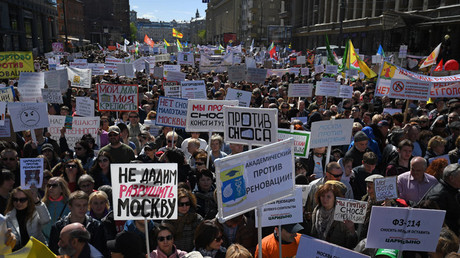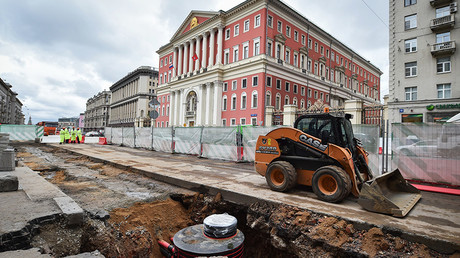Duma passes Moscow renovation bill amid protests

The bill was passed on the third reading by a vote of 399-2, with one abstention. As State Duma speaker Vyacheslav Volodin presented the draft, he recommended it be passed, telling lawmakers that the latest version was amended to protect the rights of all citizens. Leaders of four parliamentary caucuses also recommended passing the bill, as well as expanding it to the entire country.
The bill now has to be approved by the Upper House and signed by the president to come into force.
It is set to go to a vote in the Upper House on June 28. Parliamentary sources told TASS that it is likely to be approved.
The bill was drafted by a group of parliamentarians in March, soon after President Vladimir Putin met with Moscow Mayor Sergey Sobyanin to discuss launching a large-scale construction program in the city. The main idea of the plan is to demolish and replace low standard housing built in the 1950s and 60s. According to Vedomosti, if the program goes according to plan, about 8,000 apartment blocks will be torn down and about 1.6 million people will have to be resettled.
The initial draft stated that the residents affected must be given “equal” apartments, without properly specifying the term. It also allowed the authorities to pick the buildings to be replaced (on condition that at least 70 percent of the residents agree to the decision), and mandated resettlement within large areas of the city – even dozens of kilometers from the original site.
This resulted in a backlash from the public and media, with demonstrations and single-person pickets being staged. Those who opposed the bill claimed that the original draft contained many vague terms (including the term ‘renovation’) and could potentially violate the rights of apartment owners. As lawmakers discussed the bill on Wednesday, activists staged protests near the State Duma, and 11 of them were briefly detained for violating street protest laws.
The backlash prompted the sponsors of the bill to alter it. Now, resettlement must be conducted within a relatively small city district, and owners can demand monetary compensation instead of a new apartment. Specific criteria of buildings to be slated for demolition is also specified, and the authorities are now legally bound to offer replacement apartments that are no smaller than the ones to be demolished, with the same number of rooms or more.
Vladimir Zhirinovsky, flamboyant leader of the populist nationalist LDPR party, called the resettlement program “the new great migration,” and praised the city government and Mayor Sergey Sobyanin for initiating the program. He also dismissed calls to postpone the program, saying that the future was uncertain, and warning that the nation could be at war and in urgent need of money in 15 or even 10 years.
The head of the center-left opposition party Fair Russia, Sergey Mironov, said that although he and his comrades were against the original draft of the bill, the final document differed from it “like day from night,” and was worth supporting.











